Journalism in the 21st Century
In April 2004, four distinguished alumnae/i participated in a panel discussion as part of a Vassar regional program. The panel discussion, with an audience of more than 100 members of the Vassar community, was held at the American Academy of Arts and Sciences in Cambridge, Massachusetts, and was moderated by Professor of Sociology William Hoynes.
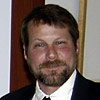 photo of William Hoynes |
William HoyneVassar professor of sociology and director of the newly minted Media Studies Program, Hoynes’ courses include “Mass Media and Society” and “New Media in America.” |
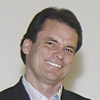 photo of Charles Reid '77 |
Charles (Chip) Reid ’77Reid covers Congress and politics for NBC Nightly News with Tom Brokaw, the Today Show, and MSNBC. He was recently embedded with a Marine battalion in Iraq. |
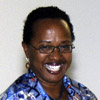 photo of Paula Williams Madison '74 |
Paula Williams Madison ’74Madison is president and general manager of KNBC-Los Angeles. Prior to her move to L.A. in 2000, she was vice president and news director of WNBC-New York. |
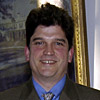 photo of Matthew Brelis '80 |
Matthew Brelis ’80Brelis, whose reporting work was honored with a Pulitzer Prize in 1987 and a Neiman Fellowship at Harvard University for the 2001-02 academic year, is assistant national editor at the Boston Globe. |
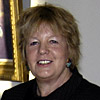 photo of Lucinda Franks Morgenthau '63 |
Lucinda Franks Morgenthau ’68Morgenthau is a Pulitzer Prize-winning journalist who writes for the New York Times and The New Yorker magazine. |
Hoynes: Public opinion polls show that trust in the news media has been declining. I’d like to ask our panelists to reflect upon how and why this is the case, what it means for the kind of work you do, and how we might reinvigorate trust in the news media. Let me start by turning to Lucinda Franks Morgenthau.
Morgenthau: I think that there’s some wonderful reporting being done across the country, investigative reporting, issue-oriented reporting. And the paradox is that in 1980, 85 percent of the public trusted the media. Now, less than 50 percent trust them. And another surprising statistic is that less than 50 percent trust newspapers, and many more trust television news. As a print journalist, that is very shocking to me. But it’s really no wonder because there has been a parade of reporters who have distinguished themselves with lies and deceptions and have turned newspapers upside down. Jack Kelley of USA Today was a Pulitzer Prize finalist for a patently false story. And Jayson Blair wrote a panoply of stories full of false sources and false datelines that led to the resignation of the executive editor of the New York Times. I think, in the end, reporters would say that the real culprits in all this are the editors who don’t train young reporters anymore. The declining circulation of newspapers means that fewer people do the work, and there is a spirit of—you have to do it faster and better and more furiously competitive than anybody else.
There’s also the question of sources. When I was working as a staff member of the Times in the 1970s and 1980s, you had to have two sources for every story you produced. And you had to give the names of those sources to your editor. Now, many reporters are given free reign and no sources are given. A recent New Yorker story by a distinguished investigative reporter about U.S. Special Forces in Iraq was totally based on anonymous sources. There wasn’t one named source at all. The increase in the use of anonymous sources in print journalism is very disturbing.
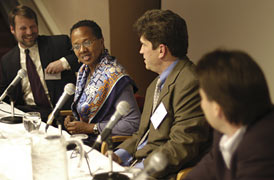
Hoynes: Perhaps, Paula, you could reflect about the difference between television and print journalism on these issues.
Madison: The difference with television is that the camera ends up being somewhat of a witness. When I was in print, I would go out in jeans and a T-shirt and my baseball cap, and just interview people. You can’t do that in television because you have to have another person with you and almost always that other person is the news photographer, and the chronicling of the interview keeps you honest. (Although, things do get left on the cutting room floor.) The policies that we have at NBC require that we don’t use anonymous sources. In my years in the newspaper business, what I recall is there began to be a change where, instead of everything being factual, you were allowed to be a bit more literary in your reporting.
But it certainly isn’t the case that bad things haven’t happened in TV. NBC, Dateline, General Motors truck? The producer didn’t quite get the kind of flames he wanted so he installed igniters. What was interesting was that the producer did not come from the world of news. That producer had come from the world of—I like to call it pseudo-news—things that look like news and are presented sort of newsy-like, but aren’t really news.
Hoynes: In recent years, various media have adopted the news format, everything from late night infomercials that look like news to pseudo-news programs, and this may have degraded our sense of what news is. Chip, how do you see this?
Reid: Well, when Lucinda first said that back in the old days, people respected the news and now they don’t, that’s certainly true. In the old days, when you said to people, “Do you trust the media?” they thought of Walter Cronkite and they thought of their community newspaper. Today when you say, “Do you trust the media?” they think of everything from NBC News to the National Inquirer. Instead of just being Walter Cronkite, now it’s the cacophony of sounds, some of it opinion, some of it information, some of it news. Where do you draw the line? We don’t tell people when it’s opinion and when it’s information and when it’s news, and it’s hard to figure that out. I think that when you ask people now, do you trust the media, they think, “You mean all that stuff? I can’t trust all of it, can I? I still trust Tom Brokaw…” And when you do polls of whether they trust the nightly news or the local news shows they say, “Yes.” But media is such a massive, noisy, undefined creature, and they say, “I just don’t trust that thing, but I trust the guy I watch on the evening news.” You’ve got a gigantic spectrum of what people think of as news now—which is not all news. That’s why I’m very happy doing what I’m doing, which is mostly reporting for the Brokaw show, because it’s one of the news outlets that is doing its best to hold the line against enormous pressure and to report the news without infecting it with a whole lot of opinion and screaming, and without giving up basic news integrity.
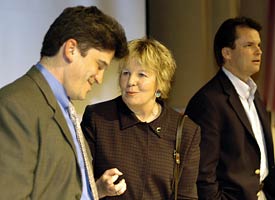
Hoynes: One of the recent developments related to this is the emergence of what people call the 24-hour news cycle, where news is reported and disseminated around the clock. How does this fit in?
Brelis: There’s a rush to get information out and be the first. Because of that, the facts can get jumbled. There’s no sifting and ordering of what’s important and what’s less important, so it’s sort of news in the raw. I think most troubling is you can end up relying on fewer sources. Once you get a piece of information from one person, depending on the news organization, you might not confirm it with somebody else, and just go with that one piece of information. It can be, and often is, wrong.
I used to be a reporter and now I’m an editor. With newspapers, the whole system is based on trust. Editors send reporters out to gather information on stories; when they come back, editors ask questions and help shape the direction of the story, but you have to rely on the reporter to a certain extent. Because of people like Jayson Blair and Jack Kelley, unfortunately, some papers have started to go towards what the Oregonian calls prosecutorial editing—where line by line, a story is vetted. I think skeptical editing is probably a better term than prosecutorial editing. It’s a collaborative effort, and if you don’t have that collaboration you’re not going to have a very good product.
Hoynes: Among the important changes in recent years are the increasing efficiency pressures in the newsroom and the growing competition for the attention of audiences. Do these economic pressures, with a shrinking audience and a shrinking newsroom staff, play a role in all of this?
Madison: The amount of information being churned out is increasing. Some of that information is journalism and some of it is not. We, in management, have allowed the lines to be blurred so that you have programs that look like what you would watch on Sunday mornings, but are not news. We have allowed programming to become so blended that it’s difficult for the public to distinguish what’s news.
The concern I have is that there’s more news, but the budgets are not growing proportionately. When I was a newspaper reporter, periodically an editor would pluck one of your stories and start checking your sources just to see. You never knew when it was going to happen. It was like your mother walking into your room in the middle of the night. You just never knew when it was going to happen, and you prayed that whatever was supposed to be in order was in order. But that’s not a standard today. Also, we define ourselves as journalists. There’s no licensing. We say, “I’m a journalist.” And so who but fellow journalists can police this? I think that if you find a bad journalist, you have to do everything in your power to drum him or her out of the business. You just have to keep screaming, even risk your own career, frankly, because we’re losing the public.
Hoynes: I wonder if the political climate after September 11th has had any impact on your experiences as news people over the past couple of years.
Madison: Well, it was kind of difficult after September 11th. News anchors were wearing American flags on their lapels, it became very difficult for me, for someone in my position, to issue an edict that no flags on the lapels on the air or, yes, you can go ahead. I really struggled with that. I think you end up trying to figure out exactly where or what’s appropriate, where the balance is. I’m not sure that that’s quite over yet, particularly in local news.
Brelis: I think there was a backlash, and we still are not back to where we were prior to 9/11. Only recently has the press, with any vigor, started questioning the Bush administration pointedly rather than asking open-ended questions. At a recent press conference, there was an aggressiveness that hadn’t been there before. But if the best question that can be asked is, “Have you ever made a mistake?” it’s not the world’s greatest journalism.
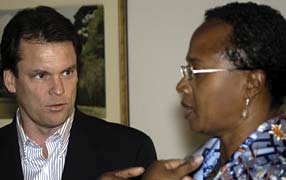
Reid: When you see a press conference, always be aware that journalism doesn’t happen in the press conferences. Press conferences are, for the most part, dog-and-pony shows. They know what questions they’re going to get. Whoever is being questioned has been coached extensively on what answers to give. So, you don’t get a lot of real journalism at press conferences. That’s the hard work we do afterwards, when we call up the advisors and staff aides and we say, “What did he mean by this? This contradicts that.” That’s when the hard journalism is done. So even though there was, I think, a period where some reporters were afraid to be aggressive because they were afraid their patriotism would be questioned, I think that’s coming to an end. I think that reporters are not so worried about that anymore. I do think, also, there was a lot of hard work being done behind the scenes where they were really doing their jobs—putting in the calls to the people who they could talk to, anonymous sources, unfortunately, very often. But just because a press conference looks namby-pamby doesn’t mean the journalists aren’t doing their jobs behind the scenes.
Hoynes: Let me bring this to a close by asking you to reflect upon something that may be hopeful about the future of journalism.
Morgenthau: I think that civic journalism, public journalism is alive and well all over the country. You can even see it in the New York Times, where reporters give their email addresses and there’s now a public advocate on Sundays who goes over stories that readers have had complaints about. The Charlotte Observer, not long ago, did a section called Taking Back Your Neighborhoods, where they produced citizens’ agendas and the resulting 18-month study was published during two weeks of full-page coverage.
Brelis: I think the quality of staffs at the nation’s major newspapers—Jack Kelley and Jayson Blair notwithstanding—has never been better. The writing is better than it’s ever been. The reporting is aggressive. Look no further than the Boston Globe and its coverage of the Catholic Church.
Reid: Well, I’m not in the newspaper business, but I’ll tell you, I’ve been impressed by how the newspapers are just beating themselves senseless over this issue. They understand that if they don’t have trust, they don’t have anything. I think in the long run, it’s going to make people realize that reporters and news organizations are very serious about regaining the public’s trust.
Madison: When I graduated from Vassar College, I didn’t know that I would be a journalist, and what I’m hopeful about is Vassar College developing a Media Studies Program. There were significant numbers of us who came from this liberal arts background and we became journalists. We went into this because, I think, for most of us, we had a desire to tackle some of society’s more difficult issues. I think we came out of Vassar College truly believing that we could change the world. I think we figured we could do it through journalism. With the young people I’ve encountered who have expressed their interest in going into journalism, I’m hopeful because they won’t come out of Vassar knowing how to white balance a camera. They won’t take speech classes or wear lovely makeup. They are people who want to make a difference—like in the old days of journalism, which was crusading. I don’t care what the cause is, just crusading. Just do something to make things better. And so that’s what I’m hopeful about.
— Edited by William Hoynes
This transcript has been edited for length and clarity. To read the entire transcript, visit www.aavc.vassar.edu/vq/articles/transcript_Fall2004.
